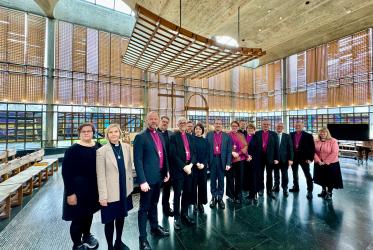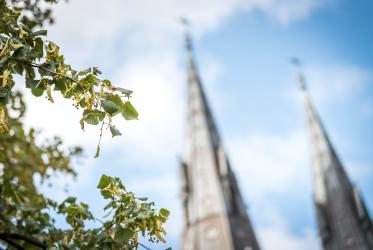By Albin Hillert*
Gathering at World Water Week in Stockholm, Sweden on 30 August, representatives from a range of faith communities and organizations engaged in water issues held a session exploring how faith communities can help achieve the sixth Sustainable Development Goal (SDG), ensuring availability and sustainable management of water and sanitation for all.
The session, entitled “Water and Faith: Building partnerships to achieve the SDGs” was the second consecutive one on faith and water at the annual World Water Week. By showcasing a range of good practices by faith communities done to help achieve the SDGs on water and sanitation, it highlighted the importance of working together, within church traditions, ecumenically and in engagement between faith communities and the water community at large.
Reflecting on the role of faith engagement in achieving the SDGs, Rev. Henrik Grape, of the Church of Sweden and coordinator of the World Council of Churches (WCC) Working Group on Climate Change, said, ”We have sometimes thought in the past that for many climate and water issues, technology will come to the rescue in the end. But we see today that while there are a lot of hopeful developments in the area of technology and environmentally-friendly solutions, we also need value-based organizations and communities to act as a driving force, to act and achieve changes in our behaviour and habits.”
”One thing has become clear to me over the years,” added Peter Weiderud, director of the Swedish Institute Alexandria. ”We sometimes have a tendency to view religious leaders and faith communities as something constant, fixed, something that cannot change. I believe we should do the contrary. If we can address issues of water in the right way, religious communities can be a tremendous resource in driving change in many communities.”
The theme of water runs through many of the world religions, the participants observed, and faith leaders rarely need to be convinced of the importance and sacredness of water as a source of life. Instead, a key point of focus should be on strengthening the many concrete water projects run by faith communities across the world.
Representing the Hindu community, Kiran Bali from the United Religions Initiative said, ”to us it is not a question of whether you are from a particular religion or indigenous tradition. What we have decided to do is to explore existing religious rituals, and see how we can make them ’green’.”
”There are so many examples of faith communities working together at the grassroots level, to help preserve water, to help conserve water, to help clean the water, and I think it’s so important that as communities we continue to revisit the practices that we have in our religions,” Bali concluded.
Sustainable partnerships focus in moving forward
”I am very happy to see what we have achieved at this year’s World Water Week,” said Dinesh Suna, coordinator of the WCC Ecumenical Water Network. ”In looking forward, what we want to secure now are sustainable partnerships and connections on issues of water. One step we are taking in this direction is through the upcoming production of an evidence-based research publication that will show what faith communities are actually doing on issues of water and sanitation in the context of SDG number six.”
Rev. Grape added, ”when we took the first steps towards engaging faith communities with the water community here at the World Water Week last year, I feared that it would be a one-off thing with high-level attendance but no long-term engagement. So I’m very glad to see that we have done this follow-up, and I appreciate the promising view of a third round next year.”
“Today’s session was very encouraging,” said Dr Asa Elfström of the Church of Sweden, and a founding member of the WCC-EWN, ”because it shows how faith engagement in water issues has not only been solid for more than a decade, but has clearly now moved also into the international arena.”
Rev. Adam Russell Taylor, lead for the Faith-Based Initiative at the World Bank Group concluded, “in the context of securing water for all and achieving the SDGs, it is clear that we have to utilize the distinctive assets and resources that we have each been given. And speaking from the perspective of the World Bank Group, the question is no longer if we should cooperate with faith communities to drive development forward, but how we can do so.”
The session was organized by the WCC Ecumenical Water Network in collaboration with Church of Sweden, Global Water Partnership, Stockholm International Water Institute, and Swedish Institute Alexandria.
WCC holds public event at World Water Week in Stockholm (WCC press release of 25 August 2017)
Faith to play key role in achieving SDGs, says panel at World Water Week (WCC press release of 31 August 2016)
*Albin Hillert is communication officer at the World Council of Churches






